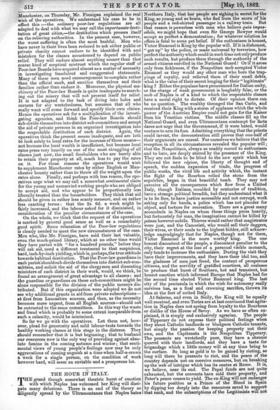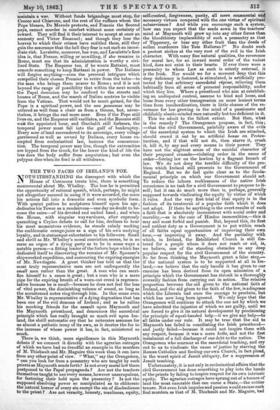THE HOUR IN ITALY. T HE grand though somewhat theatric burst
of emotion with which Naples has welcomed her King will dissi- pate many delusions. There is an end of the theory so diligently spread by the Illtramontanes that Naples hates Northern Italy, that her people are sighing in secret for the King, so young and so brave, who fled from the scorn of his people and a red-ahirted passenger in a railway train. But that reason is powerless with men who believe quia impos- sibile, we might hope that even Sir George Bowyer would accept so perfect a demonstration ; for whatever solution he offers is fatal to some pet belief. If the enthusiasm is honest, Victor Emanuel is King by the popular will. If it is dishonest, " got up" by the police, or made universal by terrorism, how perfect the authoritywhich could in such time not onlyproduce such results, but produce them through the authority of the armed citizens enrolled in the National Guard ! Or if it arose only from fickleness, if the Neapolitan mob accepted Victor Emanuel as they would any other man who bore the trap- pings of royalty, and relieved them of their small debts, what is the value of their secret longing for their" legitimate" king Either the populace have pronounced for Italian unity, or the charge of weak government is laughably false, or the mob of Naples is of a kind to which the respectable classes have a moral right to dictate. Of their opinion there can be no question. The wealthy thronged the San Carlo, and received their King with a storm of applause which the whole power of the Austrian Empire could not gain for the Kaiser from his Venetian victims. The middle classes fill up the National Guard, and even Ultramontane contempt for facts dares not urge that the Government, if it were hated, would venture to arm its foes. Admitting everything that the priests could invent, the demonstration still proves that one-half of their arguments are unreal. For ourselves we believe that the reception in all its circumstances revealed the popular will ; that the Neapolitans, always so readily moved to enthusiasm and to hate, are deeply stirred by the presence of the King. They are not fools to be blind to the new spirit which has followed the new regime, the liberty of thought and of speech, the sudden expansion of trade, the progress of public works, the vivid life and activity which, the instant the flight of the Bourbon rolled the stone from the sepulchre, began in that beautiful tomb. They may not perceive all the consequences which flow from a Uthted Italy, though Italians, moulded by centuries of tradition, have a strange political breadth, but they understand what it is to tie free, to have justice accessible and not corrupt, work asking only for hands, a police which has not plunder for object, and torture for recreation. There are a great many scoundrels in Naples on whom these things press heavily, but fortunately for man, the imagination cannot be killed by poison however subtle. Thieves would rather that magistrates were just, and the Camoristi, who would, sell their daggers, their wives, or their souls to the highest bidder, still acknow- ledge ungrudgingly that for Naples, though not for them, Victor Emanuel is the more worth' king. The one honest discontent of the people, a discontent peculiar to the city, their regret at the loss of a personal visible monarch, only tends to increase the enthusiasm. During the visit they have their improvements, and they have their idol too, and the gladness of men just freed, the content of prosperous citizens, and the servility of gratified courtiers, all coalesce to produce that burst of Southern, hot and 4ansient, but honest emotion which informed Europe that Naples had for the second time elected Victor Emanuel king. The last city of the peninsula in which the wish for autonomy really survives has, as a final and crowning sacrifice, thrown its idea at the feet of united Italy. At Salerno, and even in Sicily, the King will be equally well received, and even Tories are at last convinced that agita- tion in Naples does not spring from loyalty to the Bourbons or dislike of the House of Savoy. As we have so often ex- plained, it is simply and exclusively agrarian. The people of Tipperary do not express their political feelings when they shoot Catholic landlords or bludgeon Catholic tenants, but simply the passion for keeping property not their own, and the Capitanata is the Neapolitan Tipperary. The peasants are wretchedly poor, they have a chronic quarrel with their landlords, and they have a taste for brigandage which a little money will at any time bring to the surface. So long as gold is to be gained by rioting, so long will there be peasants to riot, and the peace of the country depends not on coercive measures, but on breaking up the web of intrigue which has its centre at Rome. It is, we believe, near its end. The Papal funds are not quite exhausted, but the convents have sold their property, and Peter's pence ceases to yield. The ex-King will not endanger his future position as a Prince of the Blood in Spain by dipping too deeply into the resources saved to support that rank, and the subscriptions of the Legitimists will not maintain a war. Without funds brigandage must stop, for Crocco and Chiavone, and the rest of the ruffians whom the Pope blesses, De Merode protects, and Francis the Second pays, cannot murder in comfort without some certainty of reward. They will find it their interest to accept at once an amnesty and Victor Emanuel; and though they lose the heaven to which their crimes have entitled them, still they gain the assurance that the hell they fear is not such an imme- diate risk. Lavalette, moreover, has won, and Lavalette's first idea is, that France, willing or unwilling, if she remains in Rome, must see that its administration is worthy a civi- lized State. The Emperor too, if he wants Rattazzi, must concede something to keep Rattazzi in power. The Italians will forgive anything—even the personal intrigues which compelled their chosen Premier to retire from the helm—to the man who brings them nearer to Rome; and it is not beyond the range of possibility that within the next month the Papal dominion may be confined to the streets and houses of Rome, and the march of Italian sentries be visible from the Vatican. That would not be much gained, for the Pope is a spiritual power, and the non possumv,s may be uttered as well from a chair as from a throne, but, never- theless, it brings the end more near. Even if the Pope still lives on, and the Emperor still vacillates, and the Romans still wait the appointed hour, and Garibaldi still forbears, the temporal power must fall into the gulf of bankruptcy. Every acre of land surrendered to its sovereign, every village garrisoned as well as owned by Italians, every house ex- empted from ecclesiastical law, hastens the consumma- tion. The temporal power may live, though the extremities are lopped from the trunk, for the lower the kind of life the less does the body suffer from amputation; but even the polypus dies when its food is all withdrawn.































 Previous page
Previous page